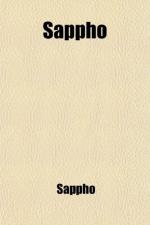|
This section contains 5,094 words (approx. 17 pages at 300 words per page) |

|
SOURCE: O'Higgins, Dolores. “Sappho's Splintered Tongue: Silence in Sappho 31 and Catullus 51.” American Journal of Philology 111 (1990): 156-67.
In the following essay, O'Higgins explicates the Sappho poem referred to as “Phainetai moi” (fragment no. “31”) in the context of a verse response by Catullus.
Sappho1 “31” concerns poetry as much as love or jealousy, like Catullus' “response” in 51, a poem which addresses Sappho's poetic claims and poetic stance at least as much as Lesbia's beauty.2 This study considers the impact of the beloved on each of the two poets, focusing especially on the disturbing and memorable image of the “broken” tongue in Sappho's poem, and the relative seriousness of Sappho's “fracture” and Catullus' sluggish tongue.
The Greek poem's first line introduces what appears to be a highly charged emotional situation, whose “literary” implications appear only later. Sappho (as I shall designate the speaker) supposes a man who sits—or any man who...
|
This section contains 5,094 words (approx. 17 pages at 300 words per page) |

|


